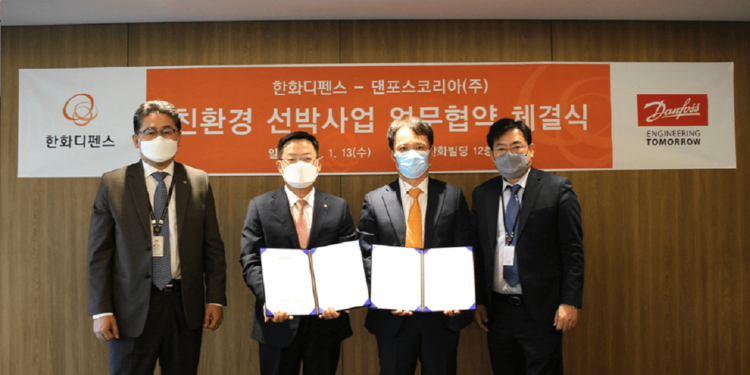Hanwha Defense has signed a partnership with Danfoss Korea with a memorandum of understanding for the advancement of electric propulsion ships.
Together with Danfoss, a Danish company providing eco-friendly solutions, Hanwha Defense will develop electricity-powered coastal ships and deep-sea marine vessels. Under the contract, the two companies will expand the distribution and electrification of offshore ship propulsion systems.
In the joint electrification project, Hanwha Defense and Danfoss will administer technology exchanges, customer response improvements, and other business operations. The main goal of their partnership is to minimize marine pollution by employing technology that could reduce greenhouse gas emissions by 70 percent. The two companies will produce the propulsion systems for electric and hybrid ships through the frequency conversion system technology.
Moreover, Hanwha is independently manufacturing the energy storage system for the ship’s operation based on lithium battery technology. While Hanwha Defense will supply energy storage technology, Danfoss will provide power conversion technology. If Danfoss applies a high-efficiency drive solution, the enhanced propulsion system will be a next-generation ship energy source.
In addition, Hanwha Defense and Danfoss have previously collaborated in a government program, supplying hybrid-electric propulsion systems and technology.
“We are very happy to cooperate with Danfoss Korea, which has various products and solutions related to ship electrical propulsion, including frequency conversion devices,” said Hanwha Defense chief executive Sohn Jae-il. “We will actively cooperate to develop and distribute eco-friendly ships in response to the government’s ‘Green New Deal’ and ‘Green Ship-K’ policies.”
Greener solutions
In response to the International Maritime Organization’s environmental regulations, the South Korean government introduced the policy Green Ship-K last December. The government has allocated around 960 billion won ($868.5 million) to fund the eco-friendly initiative.

The policy aims to establish greener solutions and energy efficiency for sustainable production to limit impacts on climate change. Under the Green Ship-K, the government will build pilot ships with liquefied natural gas technology and upgrade existing vessels.
The policy will convert 388 government ships and 140 civilian ships into vessels with reduced pollutant emission and clean energy. In the next 25 years, South Korea targets to reduce 40 percent of greenhouse gas in ships.







